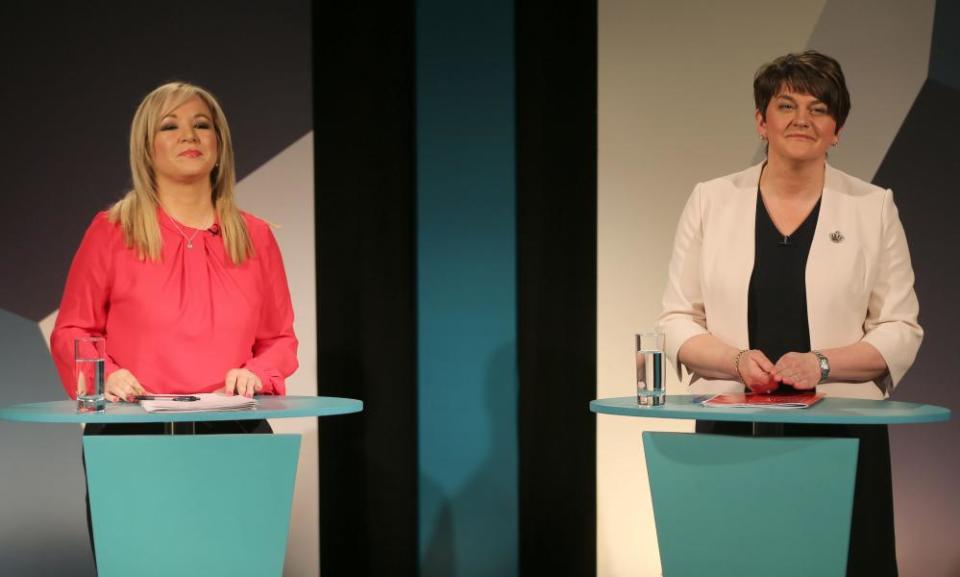The Guardian view on the Northern Ireland election: vote to keep the border soft | Editorial

Britain’s political parties await Thursday’s two byelections with anxiety. Politicians from Theresa May down have campaigned in them. On all sides, large conclusions about Britain’s Brexit-dominated politics will be read into the two results. For all that, the contests in Copeland and Stoke Central will do well to attract more than 50,000 voters to the polling stations between them.
A week after the byelections, by contrast, nearly 700,000 voters are expected to turn out at a different set of UK polling stations. These voters will be electing a new Northern Ireland assembly to replace the one that collapsed in January. These contests may have a much more direct bearing on Brexit than the byelections, because of the Irish dimension. However, only a fraction of the attention that is currently focused on Stoke and Copeland is being trained on the election in Northern Ireland.
Not much new there, of course. It was ever thus. British opinion rarely pays attention to Northern Ireland except at times of danger. Right now, though, this is particularly foolish for two reasons. First, because UK politics are moving in an increasingly centrifugal direction in which no one in London can afford to ignore regional dynamics in the way they did when the old UK two-party system still existed. And, second, because this is, in fact, a new time of danger in Northern Ireland and in Ireland as a whole.
It is 10 years since power-sharing was finally established in Northern Ireland but less than a year since the last election of an assembly. The 2 March election is ostensibly taking place because of dreadfully slipshod financial mismanagement of a renewable heat initiative introduced in 2012 when Arlene Foster of the DUP, now Northern Ireland’s first minister, was enterprise minister. Ms Foster has apologised for aspects of the policy, but in more normal parliaments she would have had to resign.
That is because, in Northern Ireland’s zero-sum politics, a resignation would be seen on both sides as a defeat for unionism and a win for nationalism. So it didn’t happen. In January, Sinn Féin therefore collapsed the executive and fresh elections were called. Yet there seems little likelihood that the outcome will soften the current rigidity between the two sides. Both the DUP and Sinn Féin are believed likely to win in their respective communities again. But Ms Foster cannot afford to bend on the RHI row, and Sinn Féin’s new leader Michelle O’Neill has to burnish her own implacability credentials after the retirement of Martin McGuinness. A renewed stand-off seems inevitable, which might in turn trigger renewed direct rule.
After 10 years of power sharing, that would be a very unwelcome outcome. It could be avoided if the two main parties – or the UK government – wanted to avoid it badly enough. The problem right now is that they don’t. But a stand-off would also be avoided if Northern Ireland’s voters prized the peace process highly enough to vote for parties that were more flexible about wanting it to work. Both the nationalist SDLP and the once mighty Ulster Unionists should offer that option, as the Alliance party does. All should encourage second preference voting across sectarian lines in the proportional representation system. It is time for this to happen. It would open an encouraging new chapter for Northern Ireland if it did.
Two realities caution against easy optimism. The first is the familiar weight of sectarian history. But the second is Brexit. The UK’s departure from the EU puts the border back on the Irish agenda, north and south. The harder the Brexit the harder the border. So Mrs May’s hard Brexit plans bring the hard border directly into play, to the enormous alarm of the Republic, where a general election may anyway now be imminent, and in spite of Mrs May’s claims that she wants the open border to continue.
The majority of Irish people, north and south, favour remaining in the EU. The majority of British voters, if they think about the issue at all, probably want the soft border to continue. The trouble is that a hard border in some ways suits the DUP, which campaigned for leave. It may also suit Sinn Féin, which could calculate that a hard border in Ireland, imposed by London, would make the unification goal more likely. In practice, therefore, Brexit is a very strong reason for Northern Ireland voters to think afresh on 2 March about the kind of assembly and executive they want. It is an equally strong reason for British and Irish opinion to urge them to vote for parties that will defend the open border and will work to defend it.

 Yahoo News
Yahoo News 